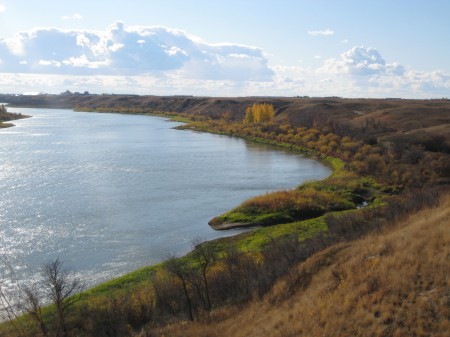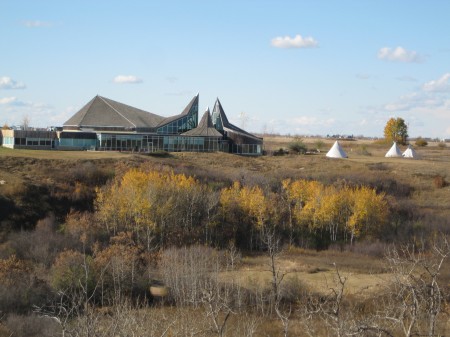
Two weeks ago when we rented a car we went out to Wanuskewin heritage park. It is a modern interpretive centre set on a very old community – people have been using this site for berry picking in the summer and as a winter village for millenia. The oldest bones found at the Buffalo jump carbon date to almost 10,000 years ago.

There was an interruption of the winter village’s use after European colonialists moved in and changed things with the railway, residential schools, etc. The modern discovery of the old village came from a fellow who came by chance and thought ‘this place is awesome!’ He was so struck by it he was moved to learn more about its history from elders and some archeologists got in on the action too – they found layer after layer of civilization on the same site. This reminded me a little bit of the Hatzic rock story – a fellow driving by a recently cleared spot looked at it and ‘knew’ something was important about it. Most of my family subscribes to the idea that he ‘felt the vibe’ of the land and his ancestors and connected to the truth of that spot. I prefer the Gladwell ‘Blink’ theory where his brain interpreted complex patterns that identified that spot as an ideal place to live – above the riverflood plain but still close to the water, sheltered but good visibility, fertile earth that is easy to dig and make a home. Those are the same features his ancestors liked when they saw it and decided to settle there, and the similar things that kept people coming back to Wanuskewin for so long: berries, a great Buffalo jumping cliff, a sheltered valley, a nice water source, wood.

It is a nice place to visit, although we missed a dancing demonstration while we were out walking in the fields (yay interpretive signs!) The museum displays are nice but few; I think the main benefit is in visiting with the people there and getting an interpretive tour.



Lovely shots – that is an amazing prairie sky. Also: *snork* Teddy junior. Pshaw on teddy bears. We have teddy bison.
Wonderful pictures – maybe there is more to the prairies than people think